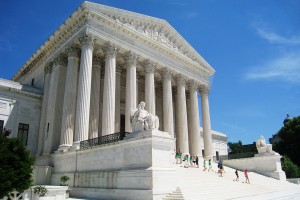Supreme Court of United States: While determining that whether the ‘inter partes review’ established under the Leahy-Smith America Invents Act violates Article III or the Seventh Amendment of the US Constitution, the Court by a ratio of 7:2, held that, inter partes review does not violate the Seventh Amendment and Article III. When Congress properly assigns a matter to adjudication in a non-Article III tribunal, “the Seventh Amendment poses no independent bar to the adjudication of that action by a non-jury fact finder.”
As per the facts, in 2001, the petitioner Oil States Energy Services obtained a patent relating to an apparatus and method for protecting well-head equipment used in hydraulic fracturing. In 2012 however the petitioner company filed a suit against Greene’s Energy (the respondent in the present case) in Federal District Court for infringing that patent. At the same time, Greene’s Energy challenged the validity of the patent and instituted inter- partes review with the Patent Trial and Appeal Board. The inter- partes review was established by the Leahy-Smith America Invents Act, according to which any person other than the patent owner can file a petition for inter partes review. The petitioner can request cancellation of “one or more claims of a patent” on the grounds that the claim fails the novelty or non-obviousness standards for patentability; and the challenges must be made “only on the basis of prior art consisting of patents or printed publications.” Once inter partes review is instituted, the Patent Trial and Appeal Board—an adjudicatory body within the PTO created to conduct inter partes review—examines the patent’s validity.
Perusing the concerned laws and precedents on the point, the Court only addressed the constitutionality of inter partes review. A majority of 7 judges observed that the inter partes review falls within the public-rights doctrine as a decision to grant patents is a issue involving public rights, specifically the grant of a public franchise. Inter partes review is simply a reconsideration of that grant, and the Congress has permissibly reserved the United States Patent and Trademark Office’s authority to conduct such reconsideration. However John Roberts, C.J., and Gorsuch, J., delivering the dissenting opinion, observed that a political appointee and his administrative agents instead of independent judges are not the competent authority to resolve a patent dispute. Citing various precedents and procedure from the past, the Judges held that, “law traditionally treated patents issued under the Patent Clause very differently than monopoly franchises when it came to governmental invasions. Patents alone required independent judges and the decision of the Majority signals a retreat from Article III’s guarantees.” [Oils State Energy Services LLC v. Greene’s Energy Group LLC, No. 16–712, decided on 24.04.2018]

